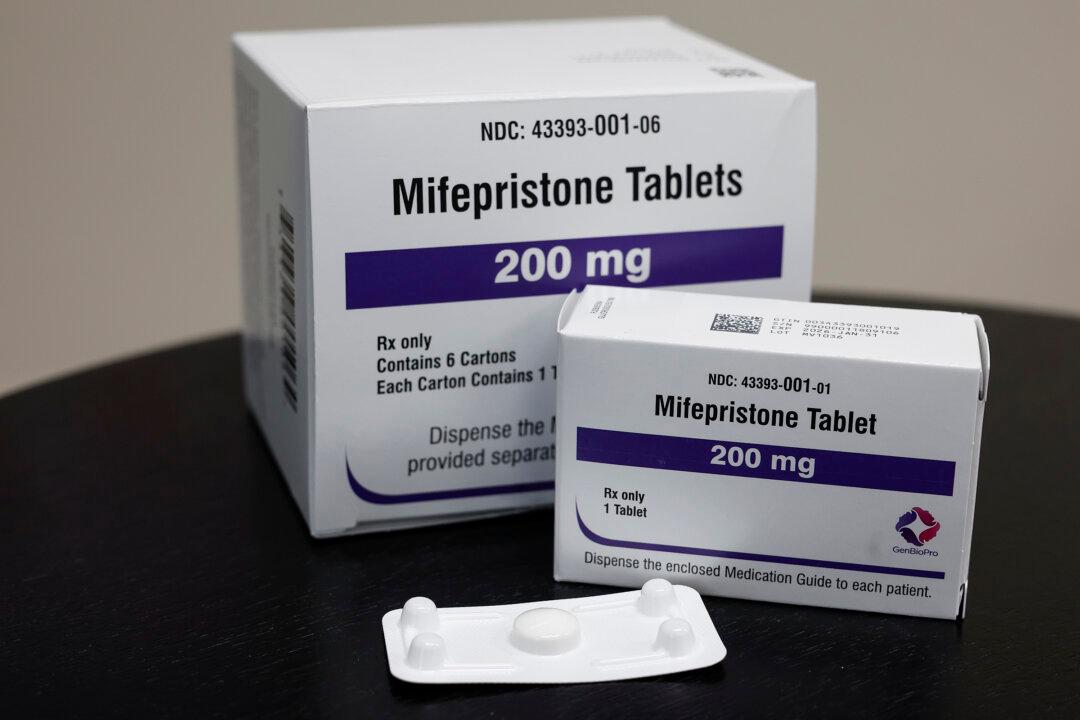The number of abortions in England and Wales is at record levels having surpassed a quarter of a million, official figures reveal.
Medical abortions involving the use of drugs accounted for 86 percent of terminations. At-home abortions—where a pregnant woman takes both pills at home—is the most common procedure, accounting for 61 percent of all terminations in 2022, a rise of 9 percent since 2021.
The DHSC said that there had been an “upward trend” of medical abortions since mifepristone was first licenced for use in the UK in 1991.
However, the department noted that there was an “additional effect” in 2020 and 2021 due to the COVID-19 lockdown, when the government allowed women to procure abortion drugs via telephone or electronic communication and for both pills to be taken at home.
‘Pills by Post’ Account for 61 Percent of Abortions
Dr. Calum Miller, a medical doctor, research fellow at the University of Oxford, and a pro-life campaigner, said that while it is difficult to say for certain what has driven the rise in abortions, a notable reason is the increase in at-home procedures.Dr. Miller told The Epoch Times, “One obvious cause of the recent significant rise is the ‘pills by post’ scheme, which has made it much easier to get an abortion.”
The doctor said that economic factors—such as the cost of living and housing costs—“probably play a part,” but “I would think that ‘pills by post’ is one of the most significant reasons for a significant increase.”
The two-pill procedure involves taking mifepristone and then misoprostol one to two days later. In 2018, women were allowed to take the second pill at home after taking the first one at a hospital or clinic following an in-person consultation. Since March 2020, women could take both pills at home.
Women can still take mifepristone in a clinic and misoprostol at home, but the DHSC said that this process had decreased from 21 percent of abortions in the first quarter of 2022 to 8 percent in the last quarter of that year. Taking both pills in a medically-supervised setting “has become a less common method of abortion,” decreasing from 37 percent in the first quarter of 2020 to 10 percent in the last quarter of 2022.
The means that fewer and fewer women seeking medical abortions are actually engaging with health professionals in person before making the decision to terminate their pregnancy.
Dr. Miller said there had been efforts made to make the process of getting an abortion “as normal as possible” and by portraying it in a manner that makes it simple and convenient.
Reversing Lockdown-Era Regulations
Before Prime Minister Rishi Sunak called the July 4 election, parliament was in the process of debating amendments to the Criminal Justice Bill, which included several amendments related to abortion. One amendment put forward by Conservative MP Flick Drummond would reverse the COVID-19 era measures, reinstating in-person consultations for before medical abortions.With the bill on hold as Parliament heads towards dissolution, Dr. Miller said it was difficult to say if the amendment would pass with either a Conservative or new Labour government, noting that a lot of Tories had already voted with the Opposition to institute the measures in the first place.
The Oxford research fellow said that there were people within the Royal College of Obstetricians who were “pushing for this to be repealed, because it’s so dangerous.”

“We really are not lacking evidence that this is dangerous,” Dr. Callum said. “And although the evidence has been building up, if certain Conservative MPs were ready to ignore that evidence before, then they might well be ready to ignore the evidence again.”
Labour MPs Stella Creasy and Dame Diana Johnson had also put forward amendments to the Criminal Justice Bill, with the former seeking to decriminalise abortion up to 24 weeks and the latter looking to remove the threat of prison sentences as a result of a woman illegally ending her pregnancy.
However, Dr. Miller noted that Labour Party leader Sir Keir Starmer was “uneasy about legalising abortion up to birth” and observed some Labour MPs had criticised Dame Diana and Ms. Creasy for their amendments.
Ms. Glindon warned against Labour “unwittingly obtain[ing] the reputation of being the party of late-term abortion, a position deeply unpopular with the public.”







